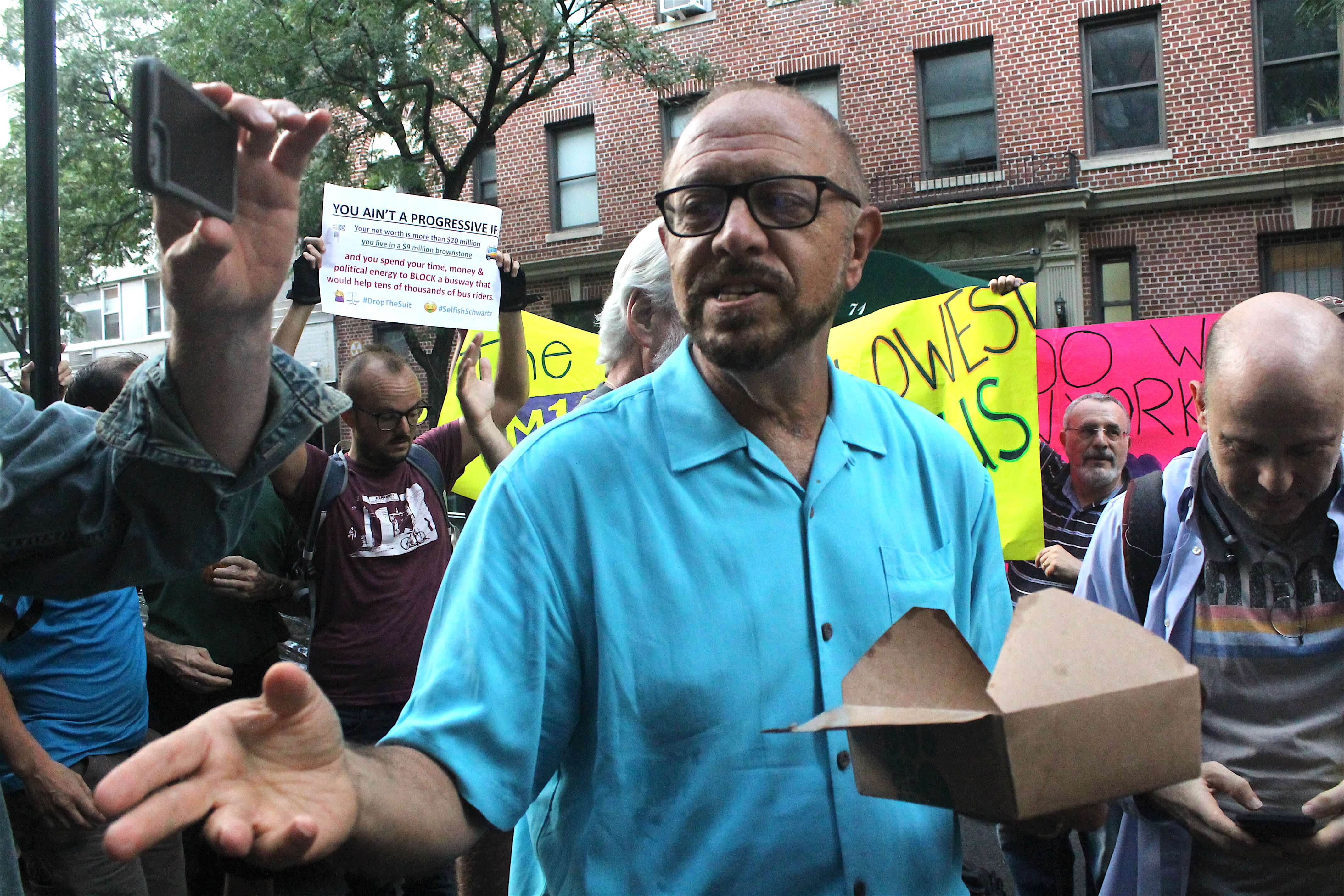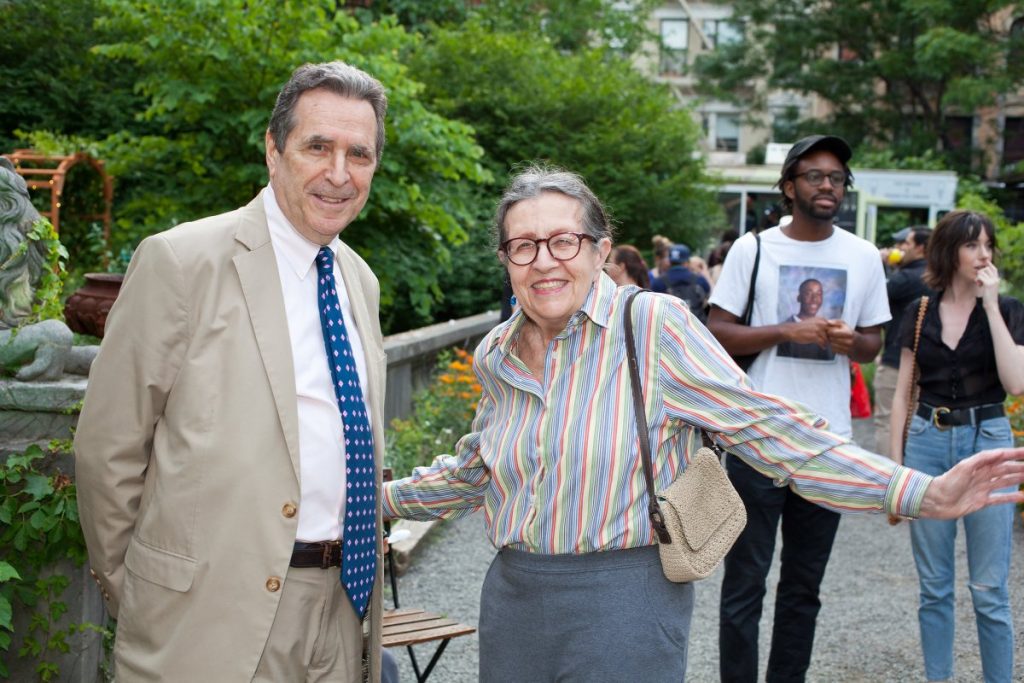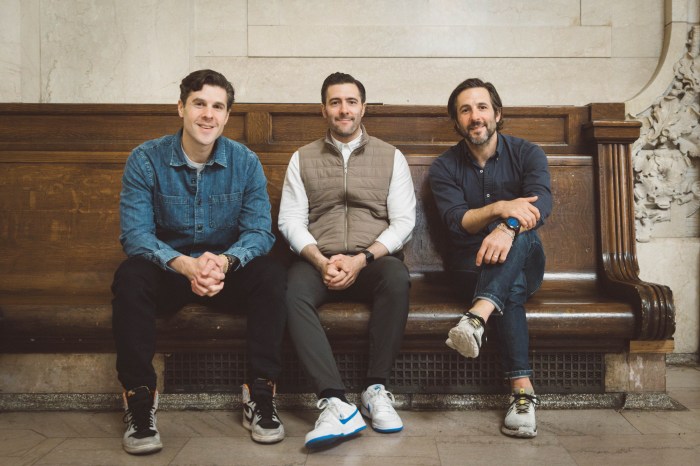BY LINCOLN ANDERSON | As Transportation Alternatives members and supporters angrily converged outside Arthur Schwartz’s home Wednesday evening — seething that his lawsuit had held up the city’s vaunted 14th St. busway — the attorney tried to make nice with them…by offering them food.
As the busway backers brandished insulting signs slamming Schwartz, like “Fake Progressive,” he responded…by handing out pastries.
“I had been given a bag of pastries by a local elderly lady I saved from eviction last week,” he said. “So I gave them out to protesters. Many took them — until someone yelled into a mic, ‘Don’t take his food!’”

Schwartz had called on local progressive leaders whom he has supported over the years to stand with him on his W. 12th St. stoop, including Mayor Bill de Blasio, City Comptroller Scott Stringer, Public Advocate Jumaane Williams and City Council Speaker. None of the pols heeded his call. However, a group of local busway opponents and neighbors rallied to his side.
“I had about 10 people standing with me,” Schwartz said, “including my longest-time Village friend, Paco Underhill, an urban planner, David Marcus and Julianne Bond, Elissa Stein and her husband, Gail Fox, Michelle Golden and a whole bunch of people I didn’t know, many whom were 12th St. neighbors.”
Stein is a current member and Marcus and Bond are former members of the steering committee of the 14th St. Coalition, the plaintiff in Schwartz’s previous two lawsuits against the busway plan. Fox is a Union Square community activist.
Asked what he made of the protest, Marcus fumed at the TransAlt group’s continually trying to shame the busway opponents for allegedly being “rich.”
“It is beyond comprehension,” Marcus declared, “that this zealous T.A. lobby — funded with millions of dollars and staff earning six-figure salaries — should accuse our multicultural multi-socioeconomic constituency of being the privileged 1%, whilst attacking an officer of the court in front of his home, by demanding he cease seeking due process.
“The T.A. zealots were quick to cheer when the lower court lifted the T.R.O., and now accuse us of dirty tricks and a frivolous lawsuit when the higher court ruled [to issue a stay],” Marcus said.
The “T.R.O.” refers to the temporary restraining order blocking the busway that a State Supreme Court justice issued in July. Two weeks ago, that same judge then lifted that T.R.O. — only for Schwartz to obtain another one three days later from the Appellate Division when he filed an appeal in the case.
Marcus said the busway battle boils down to the desires of locals versus people who live elsewhere, or as he put it, “paid outside interlopers versus the community.”
“We shall overcome and send Trottenberg packing!” he vowed.
He was referring to Polly Trottenberg, the Department of Transportation commissioner. The D.O.T. leader has relentlessly pushed the hot-button “experimental” traffic plan, which would be the first of its kind in New York City.
Beforehand, Schwartz blasted TransAlt for trying to “intimidate” him by protesting outside his home — which he shares with his wife and two young daughters — and demanding he drop the lawsuit.
“TransAlt is engaging in a form of bullying,” he charged, “which is in the tradition of Donald Trump, and has nothing to do with how we function in a non-fascistic Democratic society. … Their complaint that Village and Chelsea residents, active in block associations are ‘rich’ is demagoguery similar to what we see emanating from the White House.”
Schwartz also likened TransAlt to the Ku Klux Klan, saying, “This kind of undemocratic bullying, reminiscent of how white-hooded zealots would threaten white lawyers who represented black people in the South, or dictators who threaten lawyers who represent unpopular figures, needs to be called out.”

However, Norman Siegel, the renowned civil-rights attorney, said TransAlt was within its rights to picket the activist attorney’s townhouse.
“On the issue of protesting, it’s a fundamental right and it’s a neutral principle,” he said, meaning “grounded in law.”
While some states actually do not allow protests in front of people’s homes, according to Siegel, New York is not among them.
“In New York, you can peacefully protest in front of someone’s home,” he said. “T.A. has the right. They have to be peaceful and they can’t block the sidewalk.”
Siegel said Schwartz’s likening the cycling and transit advocates to Trump, the Klan, fascists and demagogues was disappointing.
“I don’t think that’s an appropriate statement to make,” he said.
He noted that Schwartz, as someone “in the public arena,” is going to have people criticize and potentially protest against him.
“To compare TransAlt to the Klan is inaccurate,” Siegel said. “Arthur should know better. It’s a First Amendment-protected right — Arthur should know as well as anyone — people’s right to protest. And he’s represented people that protest over the years, and that’s why I admire him.”
Siegel said he has never represented TransAlt. However, he has experienced protests outside his own home.
In the early 1980s, when he lived in the Village on Jane St. and was the project director of MFY Legal Services, striking lawyers union members protested outside his residence.
Later, in the 1990s, when Rudy Giuliani was mayor and Siegel was head of the New York Civil Liberties Union, protesters picketed outside Siegel’s Upper West Side building after he got the Klan a permit for a rally over Giuliani’s objection.
After the notoriety of the Village protest, building neighbors suddenly became more friendly to him, Siegel recalled, with one inviting him over afterward for a drink.
Regarding the Upper West Side demonstration, he said he told building management not to call the police and just let it happen.
“I predicted that within an hour they would leave,” he recalled. “What they wanted was the publicity.”
As for TransAlt protesting outside Schwartz’s house, not only did they have the right, but the attorney should not have condemned them for it, particularly given the times, Siegel asserted.
“In the Trump era, we should be encouraging people to speak up,” he said, “including picketing and protesting, and expressing their First Amendment right, not chilling that fundamental right.”




































